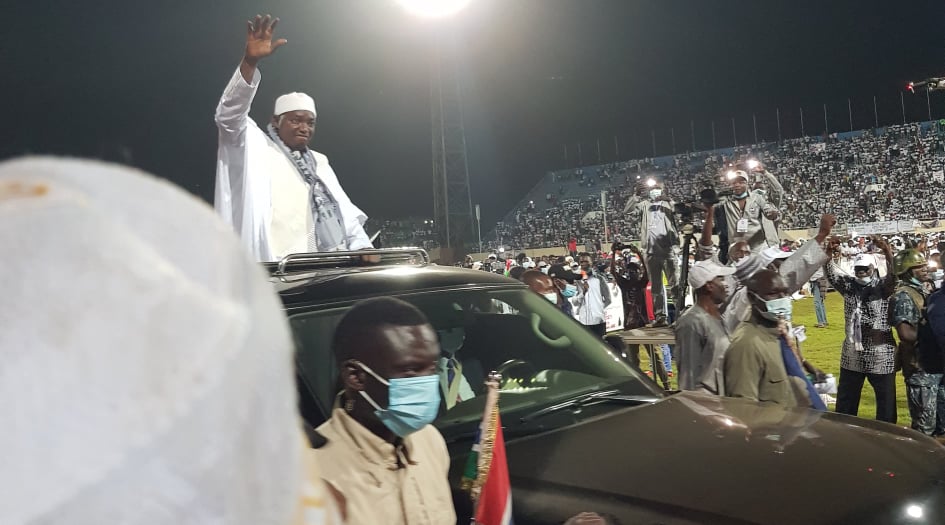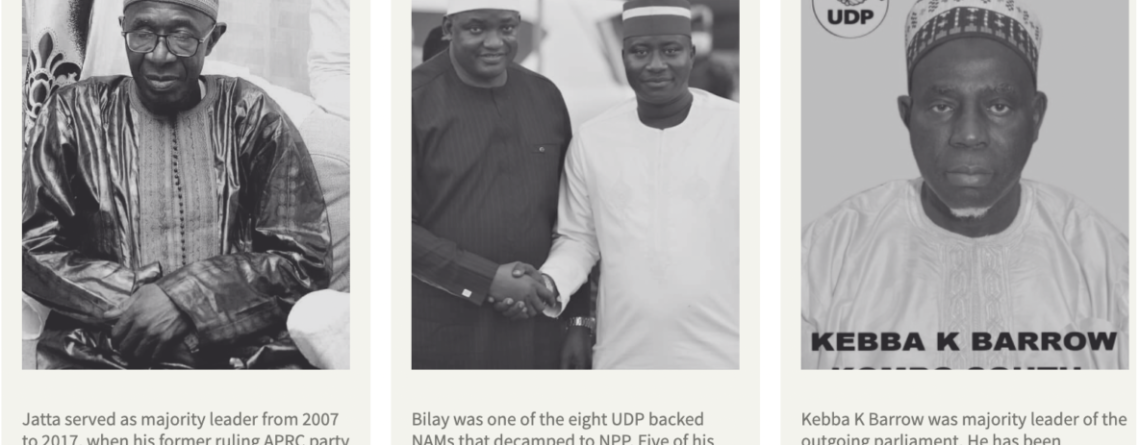Opposition make comeback but ruling NPP leads in parliamentary election
The Gambia’s opposition parties and independents have made a surprise comeback in the April 9 parliamentary elections after suffering defeat in the Dec.4 presidential election of last year. They have won a combined 29 seats, representing majority of the elective seats in the country. But they would ultimately fall slightly short of securing a simple majority in the National Assembly.
The ruling NPP and its allies have won a combined 24 seats. The President Adama Barrow has also announced the nomination of five people into the parliament. This will take his party’s total to 29.
“The opposition almost dominates and that is really impressive. I am very hopeful but of course I have to manage my expectations because it is Gambian politics and you never know,” Sait Matty Jaw, a political science lecturer told Malagen.
The Gambia has 53 elective National Assembly seats, representing constituencies across the country. And, all were up for grabs. A record total of 246 candidates were cleared by the Independent Election Commission (IEC) to contest. At least 166 were sponsored by the twelve participating political parties while the rest vied as independent candidates.
The polls were free, fair, and transparent, according to local and international observers. They also observed that the campaign and voting were peaceful and orderly, though some have raised concerns about abuse of incumbency.
“Voter inducements in monetary and material forms were reported by our observers, in both the pre-election period and on election day,’ The Gambia Participates, a local CSO election observer reported.
The election was characterised by low turnout. The election body announced that only 50 per cent of the electorate voted, compared to a record 89 per cent voter turnout during the presidential election barely five months ago.
For minorities, vulnerable, marginalised groups however, the more things change, the more they remain the same.
Only 19 women and two differently abled person contested in the polls. Three women got elected – the same number as in the outgoing parliament. No differently abled person and no Christian.
Who gets what?
The ruling NPP was expected to sweep the polls after a decisive victory in the presidential election. But the results appear to have injected a new lease of life on the opposition, some of whom had rejected the presidential election result as fraud.
At individual level though, the ruling NPP still holds a narrow majority with 18 seats. It is closely followed by main rival UDP with 15 seats. Independent candidates come third with 12 seats. The remaining seats were shared among NRP with four seats, APRC with 2 seats, PDOIS with 2 seats.
NPP’s 18+2+4+5=29 seats
Prior to the April 9 election, the NPP has only one member in the National Assembly. After all, the party is a little two years old, birthed after President Adama Barrow, who was backed by an opposition coalition reneged on his promise to step down after a 3-year transition. He formed his own party in 2019.

Technically though, the ruling party has had more than one member. Following a fallout among the parties that formed the coalition government, at least eight members of UDP decamped to the NPP. This was followed by the cross-carpeting of two GDC members. The ruling party has the backing of its coalition members: five from NRP, one from PPP, and later five from APRC.
The NPP is being backed by a grand coalition of parties and independent candidates. However, only few of them managed to put up candidates. And even fewer have won seats. Yet, with 18 to its name, 2 from APRC, 4 from NRP, and 5 people the president is entitled to nominate, the NPP will enjoy a narrow majority in parliament.
An opposition comeback or decline
The results of the parliamentary election indicate a comeback for the opposition who were heavily defeated. President Adama Barrow pulled a shock victory in all the 53 constituencies in the country, save six, namely Bakau, Brikama North, Kiang West, Kiang East, Central Baddibu and Sami, which were won by his main rival Ousainou Darboe of the UDP.
The UDP, as the biggest and ‘favoured party’ in the coalition government won 31 seats 2017 parliamentary elections. By 2022, this was reduced to 23 seats as eights of its members switched allegiance to President Barrow following a fallout. Yet two of the five people nominated by the president remained loyal to the party. This means the UDP had 25 seats in the outgoing parliament.
In the April 9 polls, the UDP has won back about ten of the constituencies that President Barrow won during presidential election. But the party could not save at least eight of its incumbents from going down.
With just four seats from the 2017 race, the PDOIS might not have the numerical strength in parliament from 2017. But it was not less influential with the presence of veteran politicians Sidia Jatta and Halifa Sallah, party chairman and SG respectively. But none have been returned.
While Halifa announced retirement from representative politics after his heavy defeat, Sidia lost to an NPP candidate in his home Wuli West constituency in what was considered to be one of the biggest shocks.
But not all is lost for the party. It has retained the Serrekunda seat through a newcomer Musa Cham. Elsewhere in Wuli East, Suwaibou Touray got reelected.
No comeback for some
Not all opposition parties have bounced back. The GDC, the biggest casualty of President Barrow’s raids into opposition heartland, has gone from winning five seats in 2017 to zero seats in 2022.
It was an outing to forget for GMC too. After his nomination for presidential was rejected by the IEC, the party leader Mai Fatty decided to throw his hat in the ring. But going up against veteran Sidia Jatta and a strong NPP in Wuli West was destined to end in defeat. He came third, ahead of UDP’s Tida Kijera, his own former executive member.
The April 9 polls was the first parliamentary election outing for newly established parties, including CA, NUP, GFA and APP. However, none of them impressed, much less securing a seat.
How independent are independents?
The April 9 polls witnessed a record number of 80 independent candidates. At least 12 of them have won, a record in the National Assembly.
But not all independent candidates are independent. In fact, most are not. The Independent candidate for Busumbala, Muhammed Kanteh has been backed by UDP after the preferred candidate Momodou Sabally’s nomination was rejected.
“We wanted Sabally as our first choice but we were alive to the fact that the Barrow government would do everything to block his nomination. That is why Kanteh was nominated as an option,” leading newspaper The Standard quoted a UDP executive as saying.
Among the remaining 11 elected independent candidates, at least five are sponsored by the Jammeh-backed faction of the former ruling APRC party. Call it APRC-NAM. They have won back all the five seats in Foni, defeating incumbents who sided with the Fabakary Tombong Jatta-led faction backing President Barrow.
Some of the independent candidates are known to be affiliated with the ruling NPP. Seedy Njie, the deputy spokesman was quoted by The Standard as saying that ‘most of those independent candidates are members of the National People’s Party. [We]will find a way of reconciling…” Most may not be accurate. Malagen can confirmed that while most independents candidates are known to be affiliated with the NPP, only three of those have won. Specifically, Sabakh Sanjal, Kiang Central seats and Nianija
From the graph above, it is clear that in the end, if independents decide to return to their parties or vote with them in parliament, the ruling NPP and allies will increase their narrow lead from 24 to 27. This excludes the 5 people nominated by President Barrow. Per the list of nominees being reported, there is no doubt that the president has his eyes on dominating the parliament by electing to field in political operatives rather than representatives of minority or marginalised interest groups. It will be 32 for NPP and allies and 26, rather than 29 for the opposition. But given that the speaker does not vote, NPP will have one vote less.
Additional reporting by Momodou Janneh and Mariama Keita

